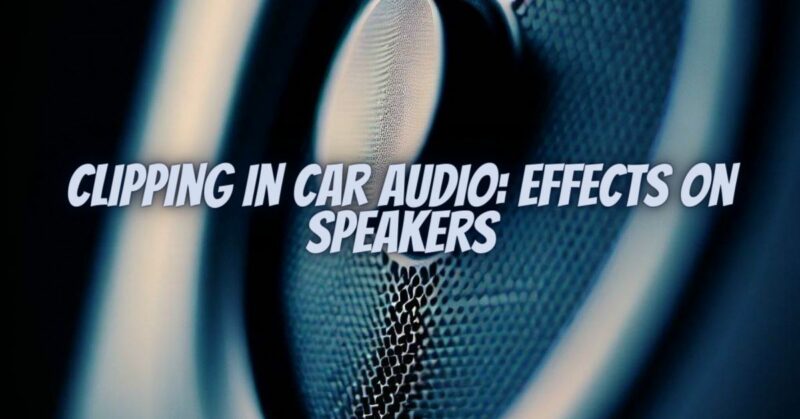Car audio systems provide an enjoyable soundtrack to our journeys, transforming mundane drives into immersive experiences. However, improper use of car audio equipment, particularly when it leads to clipping, can have detrimental effects on the speakers and overall sound quality. In this article, we’ll explore what clipping is in the context of car audio, how it affects speakers, and what steps can be taken to prevent it.
Understanding Clipping in Car Audio
Clipping in car audio, much like in home audio systems, occurs when the amplifier is driven beyond its limits, resulting in distortion of the audio signal. It typically happens when the volume is turned up too high or when the amplifier lacks sufficient power to meet the demands of the speakers. In essence, clipping is a form of distortion where the peaks of the audio waveform are cut off, producing a harsh and unpleasant sound.
Effects of Clipping on Car Speakers
When clipping occurs in a car audio system, it can have several adverse effects on the speakers:
1. Audible Distortion
The most immediate and noticeable effect of clipping is audible distortion. The audio signal becomes harsh, crackling, or buzzing, making the music sound unpleasant. This distortion can diminish the overall listening experience.
2. Reduced Sound Quality
Clipping degrades the sound quality significantly. It muddles the audio, making it difficult to distinguish individual instruments or vocal lines. High-frequency details are often lost, resulting in a less enjoyable listening experience.
3. Overexcursion
Clipping can cause the speakers’ diaphragms to move excessively. This overexcursion can lead to mechanical stress and damage to the speaker’s suspension components, including the surround and spider. Over time, this stress can cause permanent damage to the speaker.
4. Heat Buildup
Clipping can also generate additional heat in the voice coil of the speakers. This increased heat can degrade the speaker’s performance and, in extreme cases, lead to the melting of the voice coil or other critical components. Heat buildup can also shorten the speaker’s lifespan.
5. Speaker Fatigue
Prolonged exposure to clipping can lead to speaker fatigue. Just as humans become fatigued when subjected to stress or discomfort for extended periods, speakers can wear out faster when regularly subjected to clipping, reducing their overall lifespan.
Preventing Clipping in Car Audio
Preventing clipping in your car audio system is crucial to preserve sound quality and extend the life of your speakers. Here are some effective steps to prevent clipping:
1. Proper Gain Setting
Calibrate the gain (volume) control on your amplifier to match your speakers and source equipment. Avoid setting the gain too high, as this is a common cause of clipping.
2. Use Quality Audio Files
Ensure that you are using high-quality audio files with a higher bitrate and less compression. Lossless audio formats like FLAC or WAV are better for sound quality and are less prone to clipping than highly compressed formats like MP3.
3. Invest in Adequate Power
Ensure that your amplifier can deliver enough power to drive your speakers without clipping. An underpowered amplifier is more likely to clip when pushed to its limits.
4. Monitor Volume Levels
Avoid playing audio at excessively high volumes for extended periods, especially if you hear distortion. This can help prevent clipping and reduce the risk of speaker damage.
5. Use a Limiter
Consider using a limiter or compressor in your car audio system. These devices can help control peaks in the audio signal and prevent clipping by automatically reducing the signal when it approaches the clipping threshold.
Clipping in car audio can have detrimental effects on speakers and sound quality. By understanding what causes clipping and taking proactive steps to prevent it, you can ensure that your car audio system delivers clean and distortion-free sound. Regular monitoring of volume levels and responsible usage will help you enjoy an optimal audio experience while protecting your valuable speakers.


